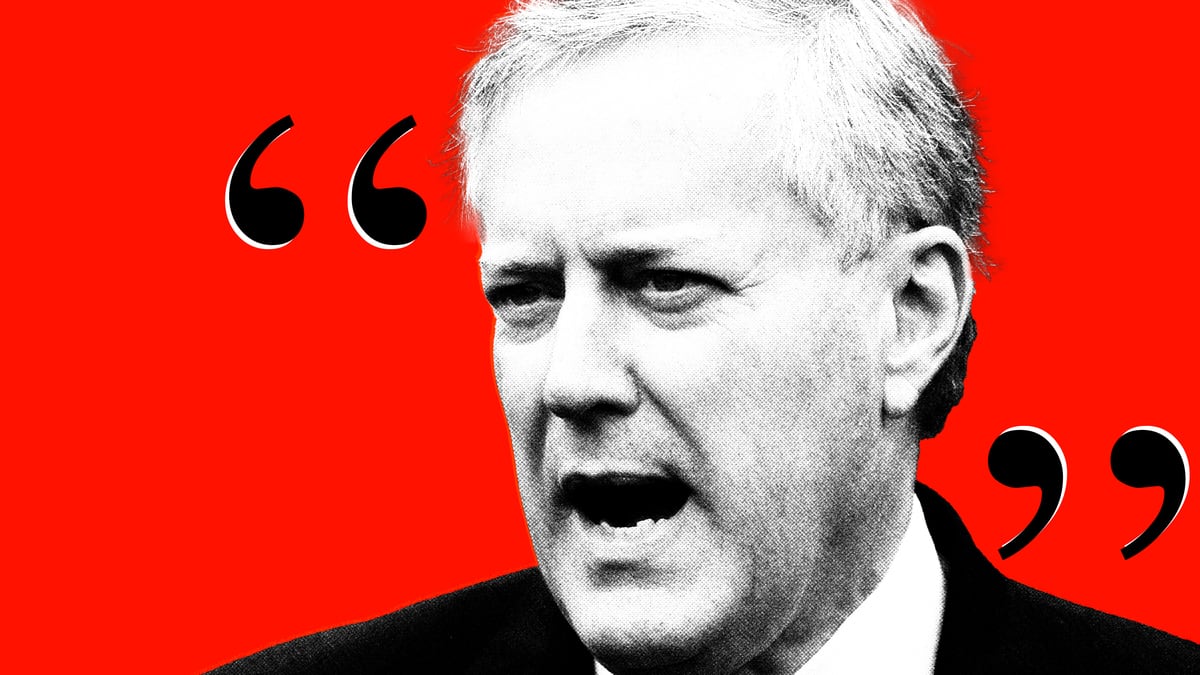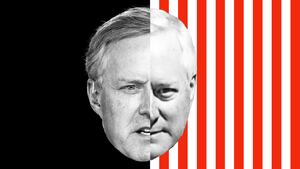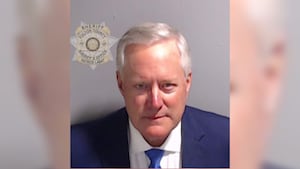For years now, Mark Meadows has avoided answering questions about his involvement in former President Donald Trump’s efforts to overturn the 2020 election—which is why his decision to suddenly testify in Atlanta federal court on Monday was such a surprise.
Trump’s one-time right-hand man is trying to wrestle the Fulton County District Attorney’s case out of relatively liberal local courts and place the case before a federal judge. But the way he did it raised serious questions—both for himself and for Trump.
So far, Meadows’ MAGA loyalty has paid off. He successfully ignored the House Jan. 6 Committee’s congressional subpoena without getting prosecuted by the feds. And his name is nowhere to be found in the recent D.C. indictment from the Department of Justice Special Counsel Jack Smith.
It’s all the more curious, then, that Meadows decided to take the witness stand on Monday and assert that he was merely doing his job as Trump’s chief of staff when he partook in what Atlanta prosecutors call a pressure campaign to flip the vote there. Because in doing so, he’s essentially pointing the finger at his boss.
“He now cannot ever say, ‘I wasn’t doing this for the president, I was acting on my own,’” said Peter Odom, a former prosecutor at the Fulton County DA’s office.
Indeed, Meadows’ entire defense rests upon the idea that he was just doing his job, that his efforts to connect Trump with people who would help to overturn the election was at the direction of the former president himself. It’s precisely that point which Fulton County DA Fani Willis is trying to prove: that Trump was at the center of this entire criminal conspiracy.
Meadows didn’t respond to a request for comment.
Even if that wasn’t Meadows’ intent, his lengthy testimony Monday may help Willis illustrate that argument.
Odom said it’s reasonable to think of Meadows’ decision to testify as flipping without actually flipping. While Meadows has yet to cut any deals with prosecutors—which would require agreeing to plead guilty to snag a lighter punishment—he has at this point definitely tied his conduct to Trump, which means they could go down together.
It’s a type of vicarious liability, as University of Georgia law school students learn from Professor Emeritus Ronald Carlson.
“There’s an ancient legal doctrine: Respondeat superior. It’s Latin for ‘Let the master answer,’” which means that a boss is ultimately responsible if he “directs the agent to do something,” Carlson said.
Importantly, Carlson noted that Meadows’ testimony was “largely exculpatory.” After all, the congressman-turned-adviser didn’t give prosecutors what they were really after: any hint that Trump’s campaign was squarely behind the multi-pronged effort to flip Georgia’s election results through fake testimony in the state legislature, prodding election officials to question voting data, and the president’s menacing phone call to Georgia Secretary of State Brad Raffensperger asking him to “find 11,780 votes” for him that didn’t exist.
“I didn’t see a smoking gun admission by Meadows on the main point—whether they were extending re-election campaigning… he did not say these were political moves,” Carlson said.
Still, having Meadows say every phone call and text message that set into motion Trump’s anti-democratic plans was part of his official White House duties is still ammunition for the DA.
“He’s giving fodder to the prosecution,” said Jonathan R. Nash, a law professor at Emory University. “Trump can still say, I didn’t tell him to do that… but the prosecution has a lot to work with.”
In some sense, Meadows had to make some version of that argument. Proclaiming that he was strictly doing his job as a White House employee is the key that Meadows hopes will unlock the path toward moving the case to federal court, legal scholars told The Daily Beast.
The American legal system has layers of courts with different jurisdiction, and federal officers are generally protected from getting hit with state criminal charges by overly aggressive local prosecutors by being able to shift cases into federal courts. It’s a strategy that has several potential upsides. One is that Meadows could try to seek immunity by claiming he was technically a federal officer acting “under the color of office” with a “colorable” defense—much the same way that U.S. mail carriers can’t be criminally charged for simply doing their government jobs. Another is that a federal case would draw jurors from a larger section of Georgia, pulling from much more conservative rural counties instead of Atlanta’s diverse and progressive city population.
His choice is also something of a revealing bet. It shows he is once again putting all his money on a single horse: Trump winning back the White House in 2024.
“Trump can pardon him. I mean, that’s huge,” Odom said.
Meadows’ decision caught many TV pundits off guard, particularly those with long careers as prosecutors who are only accustomed to thinking from a law enforcement perspective. They saw the move as risky in the extreme—with little to no potential benefit.
“We are seeing more and more white collar defendants testifying in their own defense. And this makes sense—these defendants have no priors and very little baggage to speak of,” said David Oscar Markus, one of the nation’s top defense attorneys.

“At the end of the day, a criminal defense lawyer and his client have to make a risk-reward analysis. In this case, Meadows and his lawyers really want to remove the case—they filed lightning-fast and are pushing hard for it. So they decided that the risks of testifying were outweighed by the reward of winning the removal hearing. And that’s the kind of thing that prosecutors, who have never represented an actual person, have a tough time understanding because they view the world through a prism of guilt instead of with open eyes,” Markus said.
Legal scholars told The Daily Beast we have yet to see just how damaging—if at all—Meadows’ testimony could be to himself and his 18 other co-defendants. But one thing’s for sure: Fulton County DA Willis now knows what Trump’s trusty adviser plans to say at trial. And if he deviates in the slightest, prosecutors can point that out to jurors and call his integrity into question.
“If he’s going to change his story, that’s much more complicated now. He’s said things under oath. Even if he said something that seems innocuous, the prosecution can use it at trial,” Nash said.
It’s a serious risk, and it’s exactly what shows just how important it was for Meadows to try getting his case away from a Fulton County jury made up of Southern cityfolk.
“I prosecuted people down there,” said Odom, who used to work at the DA’s office now run by Willis. “The people of Georgia… felt very offended by the president’s attempt to use Georgia as a tool—and they’re proud of their governor for standing up to him. They re-elected him.”
“Those Fulton County juries tend to be very kind to many defendants,” he said. “But I don’t think they’d be kind to Mark Meadows.”








